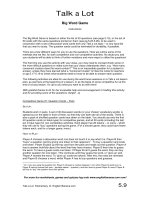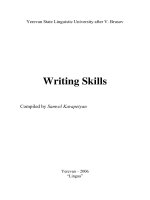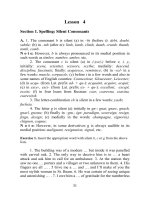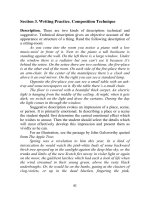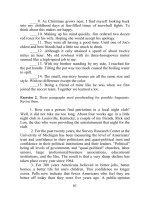Tài liệu Developing writting skills 1 part 7 docx
Bạn đang xem bản rút gọn của tài liệu. Xem và tải ngay bản đầy đủ của tài liệu tại đây (127.5 KB, 10 trang )
____9. As Christmas grows near, I find myself looking back
into my childhood days at fun-filled times of snowball fights. To
think about this makes me happy.
____10. Making up his mind quickly. Jim ordered two dozen
red roses for his wife. Hoping she would accept his apology.
____11. They were all having a good time. Until one of Joe's
oldest and best friends had a little too much to drink.
____12. Although it only attained a speed of about twelve
miles an hour. My old rowboat with its three-horsepower motor
seemed like a high-speed job to me.
____13. With my brother standing by my side, I reached for
the pot handle. Tilting the pot way too much caused the boiling water
to spill.
____14. The small, one-story houses are all the same size and
style. With no difference except the color.
____15. Being a friend of mine like he was when we first
joined the soccer team. Together we learned a lot.
Exercise 2. These paragraphs need proofreading for possible fragments.
Revise them.
1. How can a person find patriotism in a local night club?
Well, it did not take me too long. About four weeks ago in a little
night club in Louisville, Kentucky, a couple of my friends, Rick and
Lon, the duo who were providing the entertainment that night for the
club.
2. For the past twenty years, the Survey Research Center at the
University of Michigan has been measuring the level of Americans'
trust and confidence in their politicians and quasi-political trust and
confidence in their political institutions and their leaders. "Political"
being all levels of government, and "quasi-political" churches, labor
unions, large professional/business associations, educational
institutions, and the like. The result is that a very sharp decline has
taken place every year since 1964.
3. For 200 years Americans believed in better jobs, better
homes, a better life for one's children. This confidence no longer
exists. Polls now indicate that fewer Americans who feel they are
better off today than they were five years ago. A public-opinion
61
analysis group has found that large numbers of Americans, at some
times and in some places, see themselves as lower on the ladder.
Adding worse living conditions and anticipation of further decline
over the next five years.
4. Well, in looking at the picture at the left you see an old
lady. She has a very funny look on her face. As if she's lonely and
just wants to be left alone. She also looks as if she has seen a lot and
experienced lots of things.
5. A president is an appointed leader. Someone who is a
decision maker in the executive branch of our government. This
doesn't necessarily mean that the person the people elect is capable.
Just hopefully assumes. Assumes through his past record as a
politician, over the years' buildup of experience and handling
situations.
Exercise 3. The following paragraph has no capital letters or periods to
mark the beginnings and ends of sentences. Add capitals, periods, commas,
and/or other punctuation that may be needed to make the word groups into
complete sentences. Your goal is to be sure that there are no fragments.
my brother was always my best friend when I was a child
especially as we two were almost alone in the world we lived with
our old grandmother in a little house, almost a shack, in the country
whenever I think of him now I see a solemn, responsible boy a boy
too old for his years who looked out for me no matter what once
there was a bully John Anson who looked enormous to me though he
was probably an average twelve-year-old John had it in for me
because he liked Littice Grant who liked me he decided to beat me
up right before her eyes I was lucky my brother came by he didn't
interfere any he just stood there somehow though his presence gave
me confidence I licked the stuffing out of John Anson if my brother
hadn't been there I don't think I could have done it.
Section 3. Writing Practice. Composition Technique
Character’s Setting . A character’s setting helps the reader (and
author) get to know the setting. The author must know the world in
62
which her character lives in order to know intimate details about her.
Here are some exercises that will help set your character in her
setting.
First, start your character in his/her bedroom, in front of the
closet. Write for ten, fifteen minutes about the clothes hanging in the
closet, the shoes, the belts. Is it neat, color coordinated or arranged
haphazardly? Does your character have to dig for accessories or is
everything put together? Or perhaps your character has no concern
toward accessorizing. Describe your character getting dressed and
moving around in the room. The furniture, the décor, knickknacks,
etc., are all important. Did she hang onto a favorite doll from
childhood? Does your character have expensive items mixed with
dime store items?
Once your character is dressed, move him/her outside.
Next, have your character go on a walk in the neighborhood,
on her way to her favorite place. If her favorite place isn’t close
enough to reach by foot, then describe it from a moving car. Don’t
record her impressions or thoughts. Just write everything straight-
forward as she passes everything. The trees (what types?) flowers,
fences, cars, etc., etc. It might help to sketch a map. Name the
streets, shops, anything that she would pass.
Okay, now she’s in her favorite place. Describe it again,
without her thoughts or impressions. Just straight-forward again.
Hone in on details, even if they seem ordinary. Start with the door or
whatever type of entrance. Then move inside the space. Describe
sights, sounds, smells. Touch all the senses.
N o t e: You may not use all these details in your story. But the
more details you know, the better you know your character, and the
more real you can make your character for your readers.
Hope this will get you started…
Exercise1. Read the excerpt from David's journal he wrote one autumn
and
do the assignments.
By the side of J.P. Brown's grain-field I picked up some white
oak acorns in the path by the wood-side, which I found to be
unexpectedly sweet and palatable, the bitterness being scarcely
perceptible. . . . Such as these are no mean food. . . . Their sweetness
63
is like the sweetness of bread, and to have discovered this
palatableness in this neglected nut, the whole world is to me sweeter
for it. . . . I should be at least equally pleased if I were to find that the
grass tasted sweet and nutritious. It increases the number of my
friends; it diminishes the number of my foes.
Assignments.
Now take yourself to an autumn day, past or
present. Are there special chores that mark the season? Is it spent with
different people? What sensory details can you remember? Use all senses.
What are you doing? Where are you? What is the mood, atmosphere?
Freewrite this scene for fifteen minutes. As always, don't stop to edit, don't
worry about whether it makes sense. Use all your senses. Use strong verbs
and nouns. Go deep. Let go.
Exercise 2. Think of a situation to illustrate the following proverbs:
1. Too many cooks spoil the broth.
2. Don’t cry out before you are hurt.
3. The course of true love never did run smooth.
4. Confession is good for the soul.
64
Lesson 7
Section 1. Spelling
A. Adjectives with the Suffixes -able, -ible.
The suffixes –able/-ible
are Latin in origin (L. suffix –bilis). They came through French and
are active in Modern English. They are added mainly to verbs to
form adjectives, and sometimes to nouns or even phrases (eatable,
readable). Among them there are many adjectives borrowed from
Latin or French (audible, edible). here is a list of adjectives for you
to memorize. Explain what they mean.
-able: agreeable, amiable, available, capable, considerable,
disreputable, indispensable, inevitable, liable, memorable,
miserable, probable, remarkable.
-ible: audible, compatible, contemptible, edible, forcible,
horrible, illegible, incredible, intelligible, negligible, plausible,
possible, terrible, responsible, sensible, visible.
Exercise 1. Form adjectives from the given verbs and nouns, and explain
their meaning. Pay attention to their spelling and pronunciation. Use a
dictionary.
M o d e l: to accept – acceptable; to rely – reliable; to
conceive – conceivable; to value – valuable.
N o t e: after c and g the letter e is retained: to notice –
noticeable; to mange – manageable.
to avoid, to bear, to convert, to suit, to admire, to advise, to
compare, to cure, to imagine, to measure, to remove, to change, to
exchange, to force, to replace, to trace, to envy, to justify, to pity, to
vary.
Exercise 2. Fill in the blanks with the words given below. Translate the
sentences.
(adorable, indistinguishable, incurable, reasonable, audible,
disagreeable, imaginable, disreputable, imperceptible,
inconceivable, incapable, admissible, indispensable, available,
responsible, invaluable, reliable, suitable, irrevocable, valuable,
unmistakable)
65

